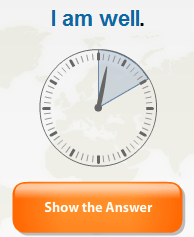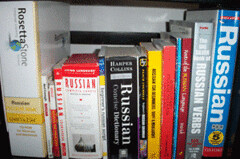My annual comparison of language learning tools.
Periodically I am asked about my opinions of various self-paced language learning tools, but I am sometimes reluctant to comment on this topic.
I am an independent user of language learning tools and I have lots of opinions based solely on my personal experience of purchasing and/or using them for learning Russian.
I previously gave a comparison of Pimsleur and Rosetta Stone on this blog. I did not, however, recommend one over the other because I feel that they should be used with different purposes in mind. Pimsleur focuses primarily on conversational skills and you get nearly immediate satisfaction from using it; Rosetta Stone offers instructions in reading comprehension, spelling, listening to vocabulary words and phrases, speaking with speech analysis tools. It has lots of bells and whistles and does not use the speaker's native language as part of the instruction process.
Before choosing your tools, I think that you need to understand what your ultimate language learning goal is. Do you want to travel to that country and be a tourist? Do you want to read a novel in that target language? Do you want to correspond with people in the target language? Do you plan to study abroad? If you need to learn conversational skills, then Pimsleur is the best way to work on this goal in your home. (The very best way is immersion, of course.) If your goal is more for reading and writing, then you can choose from several options including Rosetta Stone or Mango Languages.
Since Mango Languages is currently free, I think that everybody should at least check it out once. It is in beta test, so you may find bugs and it may not have as many bells and whistles as Rosetta Stone. The one thing that I dislike about Mango Languages is that it does use your native language as the instructional language. However, it is online 24-7, free, easy to use, and fun.
I have used several other language learning packages that I don't talk about much on this blog because I wasn't impressed with them. They will remain nameless here, but they are mostly comprised of textbooks with accompanying audio dialogs. I have never been able to learn much from these methods when used in a self-paced setting. I did begin learning French by using a textbook, audio dialogs, and classroom instruction when I was very young... but I ultimately became fluent in French by living in France. When you have to eat salad with no salad dressing for 8 weeks because you don't know the word for salad dressing, this makes a lasting impression....
(It's called "la sauce" in French. How stupid did I feel when I finally figured that out?!?)
As a side note, I have had some problems running Rosetta Stone on my Mac (v 10.4.11). I plan to call the Rosetta Stone people in Virgina this week for technical assistance. One problem with the Rosetta Stone format is that the lessons are on discs and you MUST use the disc each time you access your lessons; if the disc get scratched, you're in trouble. I've had great past experiences with their customer service, so I'll keep you posted.
tag(s): Pimsleur Mango Languages Rosetta Stone Russian Language




















